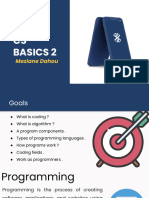0 ratings0% found this document useful (0 votes)
14 viewsComputer Programming
by: ichiboi
Uploaded by
cjnamoco623Copyright
© © All Rights Reserved
We take content rights seriously. If you suspect this is your content, claim it here.
Available Formats
Download as DOCX, PDF, TXT or read online on Scribd
0 ratings0% found this document useful (0 votes)
14 viewsComputer Programming
by: ichiboi
Uploaded by
cjnamoco623Copyright
© © All Rights Reserved
We take content rights seriously. If you suspect this is your content, claim it here.
Available Formats
Download as DOCX, PDF, TXT or read online on Scribd
You are on page 1/ 2
Computer Programming: A World of Possibilities
Computer programming is the process of designing and building executable computer
programs to perform specific tasks. It involves writing, testing, and debugging code
using programming languages.
Core Concepts
1. Programming Languages:
o These are the languages used to communicate with computers.
o Popular languages include:
Python: Known for its simplicity and readability.
Java: Versatile and widely used for enterprise applications.
C++: Powerful for system-level programming.
JavaScript: Essential for web development.
Many more...
2. Algorithms and Data Structures:
o Algorithms: Step-by-step procedures to solve problems.
o Data Structures: Ways to organize and store data efficiently.
o Common data structures include:
Arrays
Linked Lists
Stacks
Queues
Trees
Graphs
3. Software Development Lifecycle (SDLC):
o A structured process for developing software:
1. Requirement Gathering: Understanding the problem.
2. Design: Planning the solution.
3. Implementation: Writing the code.
4. Testing: Checking for errors.
5. Deployment: Releasing the software.
6. Maintenance: Ongoing updates and support.
Types of Programming Paradigms
1. Procedural Programming: Focuses on procedures or functions to break down a
problem into smaller steps.
2. Object-Oriented Programming (OOP): Organizes code into objects with
properties and methods.
3. Functional Programming: Treats computation as the evaluation of
mathematical functions.
4. Logic Programming: Uses logical rules to solve problems.
Real-World Applications
Web Development: Creating websites and web applications.
Game Development: Designing and building video games.
Data Science and Machine Learning: Analyzing large datasets and making
predictions.
Artificial Intelligence: Developing intelligent systems.
Mobile App Development: Building apps for smartphones and tablets.
Cybersecurity: Protecting computer systems from attacks.
Would you like to learn more about a specific programming language, concept, or
application?
I can provide tutorials, code examples, or answer any questions you may have. Feel
free to ask!
You might also like
- Winters Learning - MicroStation - VBA PDFNo ratings yetWinters Learning - MicroStation - VBA PDF941 pages
- 1. an Overview of Computers and Programming LanguagesNo ratings yet1. an Overview of Computers and Programming Languages10 pages
- Understanding Computer Programming 9&10No ratings yetUnderstanding Computer Programming 9&1053 pages
- Computer Programming - Wikipedia, The Free EncyclopediaNo ratings yetComputer Programming - Wikipedia, The Free Encyclopedia9 pages
- Introduction to Computer Programming for Class 10No ratings yetIntroduction to Computer Programming for Class 103 pages
- Programming Fundamentals For Engineers CH. 1,2,3No ratings yetProgramming Fundamentals For Engineers CH. 1,2,326 pages
- Basics of Programming: A Comprehensive Guide for Beginners: Essential Coputer Skills, #1From EverandBasics of Programming: A Comprehensive Guide for Beginners: Essential Coputer Skills, #1No ratings yet
- Basic Guide to Programming Languages Python, JavaScript, and RubyFrom EverandBasic Guide to Programming Languages Python, JavaScript, and RubyNo ratings yet
- Topic 1 - Introduction To Computers and Programming PDFNo ratings yetTopic 1 - Introduction To Computers and Programming PDF37 pages
- Chapter 1 Intoduction to Programming Language (1)No ratings yetChapter 1 Intoduction to Programming Language (1)26 pages
- Lecture 1: Computer Structure, Classification of Computer Programming LanguagesNo ratings yetLecture 1: Computer Structure, Classification of Computer Programming Languages42 pages
- Welcome To Computer Programming: IntroductionNo ratings yetWelcome To Computer Programming: Introduction66 pages
- Edia - Graphing and Solving Inequalities (Full)No ratings yetEdia - Graphing and Solving Inequalities (Full)4 pages
- Elastic Analysis & Application Tables of Rectangular Plates (Artigo-Papanikolaou)No ratings yetElastic Analysis & Application Tables of Rectangular Plates (Artigo-Papanikolaou)20 pages
- Student Performance Monitoring System Using Python (By SHIAVM MISHRA and SOMYA JAIN)0% (1)Student Performance Monitoring System Using Python (By SHIAVM MISHRA and SOMYA JAIN)15 pages
- SpryBit Softlabs - Web, Mobile App & Ecommerce Development CompanyNo ratings yetSpryBit Softlabs - Web, Mobile App & Ecommerce Development Company14 pages
- Spatial Data Infrastructures To Support Informed Decision-Making For Inclusive and Sustainable Development in Asia and The PacificNo ratings yetSpatial Data Infrastructures To Support Informed Decision-Making For Inclusive and Sustainable Development in Asia and The Pacific5 pages
- Program For ADC 0808 Connecting Temperature Sensor Using 8051No ratings yetProgram For ADC 0808 Connecting Temperature Sensor Using 805113 pages
- Drawing in 3D CAD (Geometric Modeling) : Upon Completion of This Chapter, The Student Is Expected ToNo ratings yetDrawing in 3D CAD (Geometric Modeling) : Upon Completion of This Chapter, The Student Is Expected To25 pages

























































































